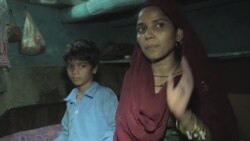NEW DELHI —
A new report by Save the Children finds that India leads the world in the highest number of babies dying within the first 24 hours of their birth, more than 300,000 a year.
Afsana Begum lost her second son to jaundice, just a month after he was born in a neighboring slum. Now pregnant again, she is determined that her baby enter the world in a safer environment.
“If you have a baby in the house, they only get a tetanus shot. If you have a child in a hospital, they will get all the necessary immunizations. That’s why I think it’s better to go to the hospital,” she explained.
It’s a message that Save the Children wants more expectant mothers to hear.
Best countries to be a mother
1. Finland
2. Sweden
3. Norway
Worst countries to be a mother
1. Democratic Republic of the Congo
2. Somalia
3. Sierra Leone
The international non-governmental organization sounded the alarm this week with its annual State of the World’s Mothers report, which says India accounts for 29 percent of all global first-day deaths.
The three major causes of newborn mortality are pre-term birth, severe infections, and complications during childbirth. Save the Children said these three conditions alone account for 80 percent of all newborn deaths worldwide.
In India, one of the major challenges includes a lack of access to proper medical care, including well-trained frontline health workers and appropriate facilities for childbirth.
Save the Children sends a mobile clinic into a slum in north New Delhi once a week, so pregnant women who would normally have to travel 10 to 15 kilometers to the nearest hospital can meet with Dr. Veena Dhawan for crucial prenatal visits and basic education that can save a baby’s life.
“They [these pregnant women] don’t know that we should have good nutrition and we should go and register in the hospital," the doctor explained, "so that our delivery is conducted in a hospital safely. They usually get delivery done at home, where there is no facility and the child dies due to infection.”
Save the Children said governments must step up to fight high infant mortality rates in South Asia, by addressing issues like chronic malnutrition. The group says more than 1,000 babies die every day in India, Pakistan and Bangladesh due to preventable causes.
Prema Sagar went to the mobile clinic to ensure her baby does not become a statistic.
“I want my child to be born healthy and to have a normal delivery. It’s my first pregnancy, and I want my child to be born in a hospital,” she said.
In India, the growing wealth disparity poses an even greater challenge. In its report, Save the Children said, if all newborns in the country experienced the same survival opportunities as those from the richest Indian families, nearly 360,000 more babies would survive each year.
Afsana Begum lost her second son to jaundice, just a month after he was born in a neighboring slum. Now pregnant again, she is determined that her baby enter the world in a safer environment.
“If you have a baby in the house, they only get a tetanus shot. If you have a child in a hospital, they will get all the necessary immunizations. That’s why I think it’s better to go to the hospital,” she explained.
It’s a message that Save the Children wants more expectant mothers to hear.
Fact Box Save The Children's Mother Index
Save the Children's Mother's IndexBest countries to be a mother
1. Finland
2. Sweden
3. Norway
Worst countries to be a mother
1. Democratic Republic of the Congo
2. Somalia
3. Sierra Leone
The three major causes of newborn mortality are pre-term birth, severe infections, and complications during childbirth. Save the Children said these three conditions alone account for 80 percent of all newborn deaths worldwide.
In India, one of the major challenges includes a lack of access to proper medical care, including well-trained frontline health workers and appropriate facilities for childbirth.
Save the Children sends a mobile clinic into a slum in north New Delhi once a week, so pregnant women who would normally have to travel 10 to 15 kilometers to the nearest hospital can meet with Dr. Veena Dhawan for crucial prenatal visits and basic education that can save a baby’s life.
“They [these pregnant women] don’t know that we should have good nutrition and we should go and register in the hospital," the doctor explained, "so that our delivery is conducted in a hospital safely. They usually get delivery done at home, where there is no facility and the child dies due to infection.”
Save the Children said governments must step up to fight high infant mortality rates in South Asia, by addressing issues like chronic malnutrition. The group says more than 1,000 babies die every day in India, Pakistan and Bangladesh due to preventable causes.
Prema Sagar went to the mobile clinic to ensure her baby does not become a statistic.
“I want my child to be born healthy and to have a normal delivery. It’s my first pregnancy, and I want my child to be born in a hospital,” she said.
In India, the growing wealth disparity poses an even greater challenge. In its report, Save the Children said, if all newborns in the country experienced the same survival opportunities as those from the richest Indian families, nearly 360,000 more babies would survive each year.





